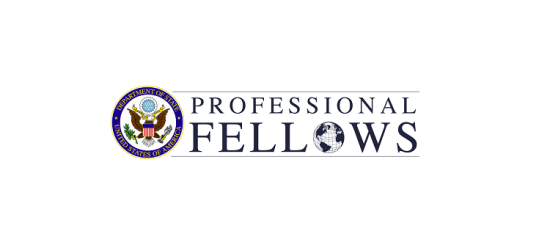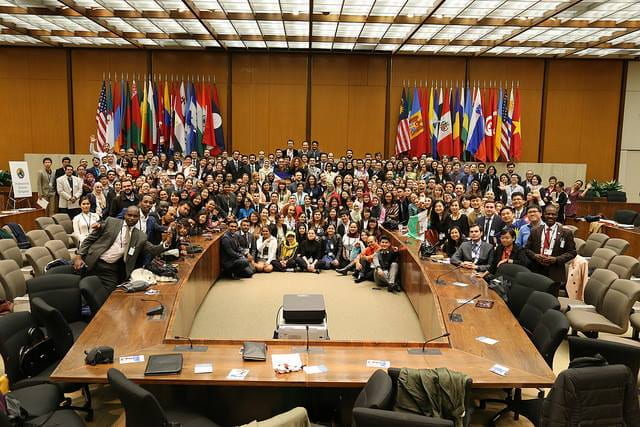
by Chanson Benjamin, GWU undergraduate student (SMPA 3350)
Public Diplomacy exchanges bring a wide variety of foreign professionals to the U.S. to help them achieve their own goals and, ultimately, U.S. policy goals as well. One of our goals is to promote the growth of grassroots democratic organizations and free media in developing countries. The Professional Fellows program brings hundreds of NGO activists, entrepreneurs, journalists and local government officials to America for several months of engagement with mentor organizations here, culminating in a Professional Fellows Congress that unites all the Professional Fellows at the end of their programs.
This May, I had the privilege of attending the final reception for the Professional Fellows Congress in Washington, D.C for their final time in the United States. Over 270 Fellows from 60 countries attended the reception, in the Benjamin Franklin Diplomatic Reception Rooms at the Department of State, to wrap up their several months of fellowships at different locations across the country.
One such person was Oscar Portillo Dueñas of El Salvador. Dueñas got his start studying journalism in college, interning at both Diario Co Latino and the local U.S. Embassy’s Public Affairs Section. After graduating in 2016, he got a job with, a prominent Salvadoran daily, where focuses on multimedia and video stories in the country’s expanding online market.
In February, he was accepted into the Professional Fellowship program. He was mentored by Doha Debates in Washington, D.C. Oscar told me, “I’m really grateful to the State Department for that opportunity. During his time in America, despite being from a country featuring in U.S. domestic debates over immigration “nobody saw me as different. No one was judging me for being a Salvadoran.”
Farah Ghodsinia, a peace activist from the Philippines, focused during her Professional Fellowship on community understanding initiatives in Cleveland, Ohio. Farah was part of the Young Southeast Asian Leaders Initiative (YSEALI). She worked in Cleveland with the city hall and with the community relations board on person-to-person projects and talked directly with members of local communities.
“What really makes America great,” she told me, “Is how it manages to continue its struggle to include new people in social justice.” The welcoming atmosphere she found in Cleveland was quite different from the American culture she previously saw in movies and on the news. After observing how America has overcome some of its own struggles, she is inspired to return to the Philippines to help resolve Christian-Muslim conflicts on Mindanao. She said that, as a result of her program, in the U.S. “I learned that the impossible problems we have to overcome are not really impossible.”
Raymond Musiima of Uganda, a Professional Fellow who is National Coordinator at the Africa 2000 Network and Hemophilia Foundation in his home country, fully agreed with this sentiment. He told me, “Issues like food deserts, gender discrimination and income inequalities are not African or Asian issues. They are everywhere! To me, the difference between our countries and America lays in the path the American people have chosen to take — in mitigating these challenges.”
Musiima’s Fellowship took him to Michigan State University, where he studied cases of business management. Yet, he added, as important as his vocational training was, the relationship he had with his host family was equally instructive. Comparing it with the technical information and training he received, he said, would be like “choosing between my heart and my soul.”
For Mirela Juka, who is the Legal Counsel at the Down ’s Syndrome Foundation of Albania, the most important part of her experience was the program itself. “New people from all over the world from many different cultures, religions, backgrounds — all connected by one purpose, which was this professional program.”
Juka’s Fellowship was in Denver, where she was impressed with the importance that local citizens placed on the outdoors, especially their love of hiking. Before this exchange program, she told me, she had mostly known about America through movies and television. “When I came here myself, I saw a very strong community feeling that I didn’t expect. I saw a welcoming environment and a strong connection in families.”
Talking with many other Fellows at the ending reception, I heard the same feelings repeated by all. They agreed that America is not great because our country has no challenges in her path. Instead, they felt, America is great because she confronts her challenges and finds ways to overcome them.
The American story, they said, is not one of easy victories. It is one of hope. It is a story that inspires exchange visitors with the ultimate message: “If America can do it, so can you.”


